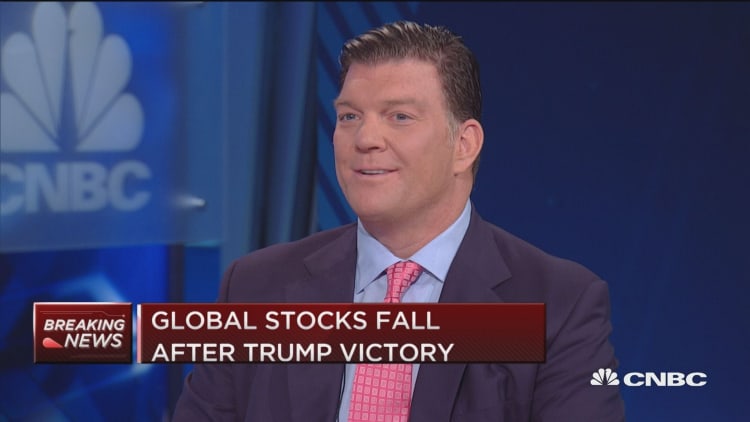
For as much as the Federal Reserve professes its independence, it is not immune to politics. Financial markets are well aware of this sensitivity and are beginning to rethink where the central bank is heading, following Donald Trump's shocking election victory.
Prior to Tuesday's election, Wall Street widely expected the Fed to enact its first rate hike in a year at the December Federal Open Market Committee meeting.
However, as it became clear that Trump was going to score an improbable victory over Democrat Hillary Clinton, the market recalibrated.
At one point overnight, traders had put their anticipation for the December fed funds rate — the Fed's target for overnight rates — as low as 0.45 percent, or just 4 basis points above its current rate. That would translate to a minimal probability for a hike next month.
"With the violent reaction being seen in financial markets, there's a good chance that a rate hike from the Federal Reserve is less likely in December," said Mark Hamrick, Bankrate.com's senior economic analyst. "The Fed has wanted to move further along the path toward normalization, or higher rates. As the election has demonstrated, we live in times that are anything but predictable."
But Fed horse-trading indeed is unpredictable itself. As the market began to digest the Trump victory, dire scenarios began to ease and futures trading changed.
The most recent level for the December funds contract implied a rate of 0.49 percent — which the CME said translates into a 71.5 percent chance of a hike, down about 5 points from Tuesday. The market more broadly struggled to make sense of what Trump's win meant, pushing short-term rates lower but sending longer-duration government debt yields substantially higher.
The prevailing wisdom from Wall Street analysts — none of whom predicted Trump's victory — was that the Fed is now more likely to be on hold.
"Insofar as there is a change in U.S. domestic policy, it will probably be towards looser monetary and fiscal policy which would provide a boost to global demand," Andrew Kenningham, senior global economist at Capital Economics, said in a note. "Fed officials will wait to see how things pan out in the coming weeks, but it now seems more likely that they will leave rates on hold in December."
The uncertainty is understandable in that Trump himself has been enigmatic when it comes to the Fed, ripping Chair Janet Yellen but also stating a preference for low rates.
He won't be able to do much about Yellen, whose term runs to February 2018, but he will be able to name as many as five new FOMC members in his first 18 months, according to an analysis by Goldman Sachs.
Markets will be watching closely to see the direction Trump takes the Fed at a critical time for monetary policy.
"When faced with volatility central banks tend to kick the ball further into the long grass," Quentin Fitzsimmons, T. Rowe Price global bond manager, said in a statement. "The Fed's credibility is going to be under pressure and that's an international story, not just a national story."


